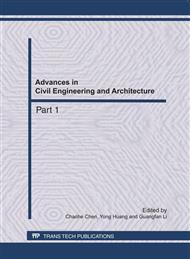p.6947
p.6951
p.6955
p.6961
p.6965
p.6971
p.6976
p.6984
p.6990
Kang Bai-Wan's Mansions from the Ecological Perspective
Abstract:
Kang Bai-wan’s Mansions is one of the three famous landlord manors in China; it is located at Kangdian town in Gongyi city, Henan province; it is a large architectural complex built in Qing Dynasty. This paper will research on the general layout, courtyard environment and cave dwelling building of Kang Bai-wan’s Mansions from the ecological perspective, to explore the ecology philosophic thought and local structural techniques contained in the traditional Chinese architecture and to point out that the combination of tradition and modernity is the main road for the Chinese ecological buildings development.
Info:
Periodical:
Pages:
6965-6970
Citation:
Online since:
May 2011
Authors:
Price:
Сopyright:
© 2011 Trans Tech Publications Ltd. All Rights Reserved
Share:
Citation:


